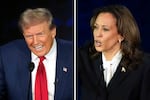Editor’s note: Election Day is Tuesday, Nov. 5. Stay informed with OPB on the presidential race, key congressional battles and other local contests and ballot measures in Oregon and Southwest Washington at opb.org/elections.

Republican presidential nominee former President Donald Trump, left, and Democratic presidential nominee Vice President Kamala Harris during an ABC News presidential debate at the National Constitution Center, Sept. 10, 2024, in Philadelphia.
Alex Brandon / AP
Younger Oregonians are leaning toward Vice President Kamala Harris rather than former President Donald Trump in the November election — a less-than-shocking note given the state’s demographics. But a new OPB poll finds that Generation Z and Millennial voters aren’t all that enthusiastic about either major party option.
DHM Research surveyed 600 Oregonians between the ages of 18 and 40 the week of Aug. 6. Harris had taken over the Democratic campaign from President Joe Biden by then and Minnesota Gov. Tim Walz had just been named as her running mate.
At the time, 45% of respondents said they would vote for Harris, and 28% said they supported Trump.
“It speaks to a dissatisfaction with the major party candidates,” said pollster John Horvick. “I mean Kamala Harris at 45%? That’s not a particularly strong number for young Oregonians in a liberal Democratic state.”
Related: What you need to know about voting in Oregon and Southwest Washington
The margin of error in the survey was 4%. Robert F. Kennedy Jr. was still in the race when it was conducted, and 12% of respondents said they preferred him. Kennedy dropped out on Aug. 23 and endorsed Trump.
“That is consistent with national numbers where young people are particularly attracted to RFK,” Horvick said.
The DHM poll asked younger Oregonian voters and potential voters about their overall impression of candidates.
President Joe Biden had the highest negatives at 66% followed by Donald Trump at 62%. Kamala Harris had negatives of 43%.
Related: Issues important to Oregon voters
Horvick said what struck him about the numbers was that 48% of respondents had a positive view of Harris, compared to 30% who said they had a positive view of Joe Biden.
“Forty-eight percent is not an historically huge or great number. But the gap between the incumbent president and the new nominee is pretty substantial,” Horvick said.
Horvick thinks Oregon is very likely to be carried by Kamala Harris. The last time a Republican won Oregon’s electoral college vote was in 1984 when President Ronald Reagan was reelected in a landslide, carrying 49 states in all. But the poll shows Democrats would have faced a stiffer test if Biden had remained on the ticket.
Related: Listen to 'OPB Politics Now'
Pacific University political scientist Jim Moore said the election outcome in Oregon is so predictable that the state has simply dropped off the national political radar screen, at least when it comes to the presidential race. (Oregon is home to one of the most hotly contested U.S. House races, the 5th Congressional district.)
Trump, for example, has not set up a campaign office in Oregon and didn’t put a statement in the official state voter’s pamphlet.
“It’s something of a slap in the face for Republicans here in Oregon,” Moore said. “He doesn’t think that you’re going to make a difference, so there’s no campaign here.”
The poll also found that young Oregonians are disenchanted with both major parties. Only 23% of respondents were registered as Democrats and 12% as Republicans. A full 48% said they were nonaffiliated voters. Some of that may be a result of Oregon’s motor voter law, under which people who qualify to drive are also registered to vote as unaffiliated.
Some, however, is simply the mood of voters right now.
“Young people are just saying: ‘I’m out with political parties,’” Horvick said.
“That doesn’t mean that they’re swing voters in that they sometimes vote for Democrat or Republican [candidates]. But they are rejecting the labels Democrat and Republican.”
